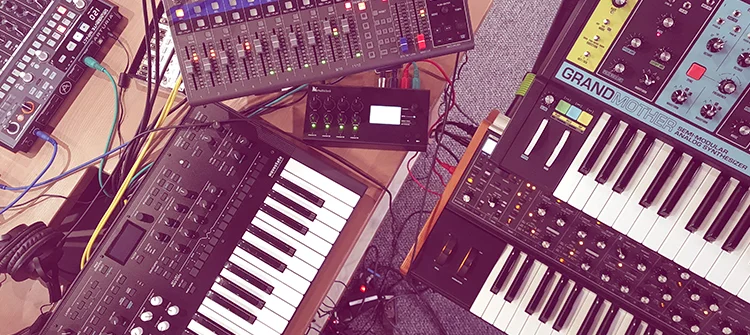
At Wavezoo, electronic music is part of our DNA. And if we had to highlight a couple of music genres within electronica, those would be House and Techno Music. But do you know where they come from? Or what similarities and differences they have? Let’s explore the most important styles of electronic music.
- House Music: A peek through its History
- Techno Music: From Detroit to the world
- The subtle but distinct differences between House and Techno
House Music: A peek through its History
House Music is a type of high-tempo music, a genre of electronic dance music that began in Chicago in the early 80s. It is one of the cornerstones of modern club music. It’s hard to imagine what the sound would have been like if house music hadn’t been born.
But as with any other cultural movement, there is no particular moment when disco magically appeared. It was an evolution of studio experiments and advances in DJ technology.
Before house, disco reigned and reached its peak in the late 70’s, becoming an underground movement born out of urban gay culture in New York City. The predominantly LGTBI, African-American and Latino communities popularized subway nightclubs and accelerated the dance music culture.
Some pioneering DJs, like Frankie Knuckles and Ron Hardy used their knowledge of hip-hop, disco and dance, to create a perfect combination of sounds, remixing tracks and adding synthesizers and drum machines. House music set the standard for nightclub music with 110-130 beats per minute and stretched the rhythmic parts and breaks in the tracks.
This new sound was put to the test in Chicago venues like The Warehouse and Music Box. Those clubs were the places to go to hear mixes with the hardest beats, powerful melodic hooks and extensive disco remixes, all under the prism of the futuristic vision of European electronic music. The Warehouse was so influential that it is recognized worldwide as the place that gave house music its name.
Here are some exponents House DJs:
- Erick Morillo
- Dany Tenaglia
- Hernán Cattáneo
- Deep Dish Modjo
- Róger Sánchez
- Robbie Rivera
- Bob Sinclar
- Moby
- Fedde Le Grand
- John Digweed and Carl Cox
- Claptone.
Techno Music: From Detroit to the world
Techno is a style of electronic dance music created during the early 80s in Detroit. It started as a variant of house, made by a select group of Detroit producers whose main influences were The Electrifying Mojo and their constant trips to Chicago.
Juan Atkins “The Creator”, Kevin Saunderson “The Elevator”, Derrick May “The Innovator” (later known as The Belleville Three), Eddi Fowlkers , were the responsibles for the evolution of Detroit techno.
The history between House and Techno Music was very close. There was a kind of exchange between Chicago and Detroit. The house music coming from the first city influenced the new Detroit sound created by The Belleville Three. Techno began to evolve at the Cheeks club and later at The Music Institute.
Atkins’ Model 500 project and new productions by May, Saunderson and others moved techno away from house and towards sounds with more synthesizers and drum machines like the Roland 808, 909 and 303.
DJ’s exponents of Techno:
- Adam Beyer
- Laurent Garnier
- Richie Hawtin
- Jeff Mills
- Carl Craig
- The Chemical Brothers
- Sven Väth
- Joey Beltram
- Underground Resistance
- Dave Clarke
- Fatboy Slim
- Marco Carola
- Marco Bailey
- Sasha
- Paul Van Dyk
- Sam Paganini
The subtle but distinct differences between House and Techno
House and Techno are two different types of music genres that are often confusing when people first hear them. Both genres use heavy synthesizers, which give them an electronic beat.
However, both are different in terms of instruments used and the characteristics. For many people, the distinction between the genres is very clear, while for others, the combination and overlapping of many genres together has blurred the lines between the genres.
House Music
Uses features such as bass drum on every beat, 4/4 rhythms with the kick on 1 and 3 and snare on 2 and 4. The tempo ranges from around 120 to 130 bpm. Deep basslines are a central part of the sound, often being looped in cycles with saturated, edgy drums.
Structurally, house tracks generally consist of an intro, verses, a midsection, choruses and an outro. You can also find electronic music elements like breakdowns and drops
Techno Music
Uses synthesizers, keyboards, samplers, drum machines, sequencers, and personal computers too, but Techno music employs faster tempos ranging from 120 to 150 bpm, with a ‘four-on-the-floor’ rhythm emphasizing the kick on every beat.
Songs have few or no letters, usually made to sound robotic, but are structured in a repetitive way to maximize the danceable effect of the music, as well as to enhance the effects that most “disco-goers” are looking for.
Unlike House music, which features samples from older disco or fun records, Techno aims to create a mechanical and colder sound, shifting the focus away from melody or hooks to rhythm and timbral atmospheres.

